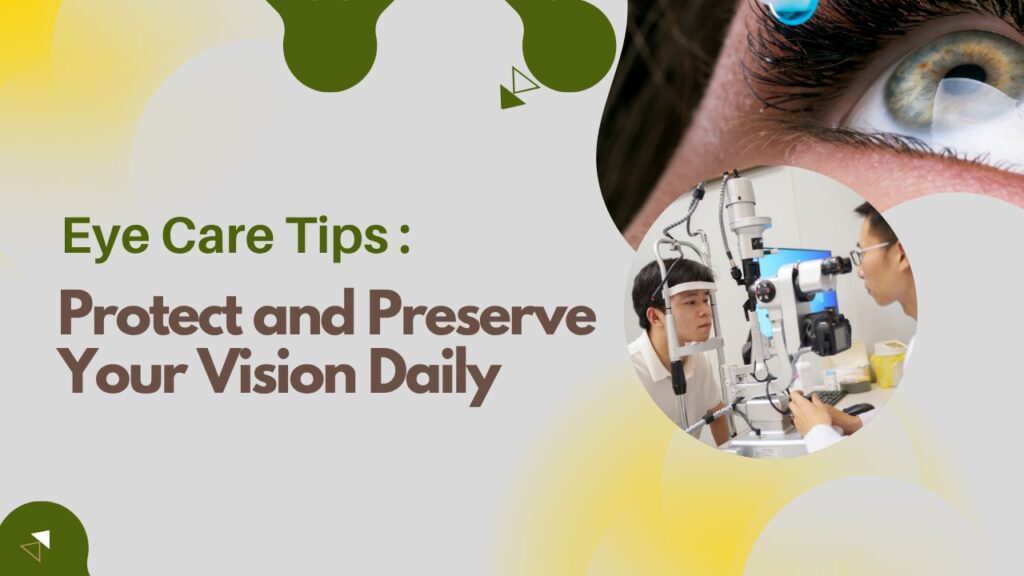Our eyes are one of the most important and delicate parts of the human body. They help us see the world’s beauty, understand emotions through expressions, and enjoy life in full color. Yet, many people do not pay attention to their eye health until a problem occurs.
In today’s world, taking care of our eyes is more important than ever. With long hours spent in front of screens, exposure to pollution, and unhealthy diets, our vision is constantly under stress. These factors can lead to issues like dry eyes, blurred vision, and discomfort—warning signs that often go unnoticed.
Eye care should be a regular part of our daily routine. As people age, the risk of serious conditions like glaucoma and macular degeneration increases. Preventive eye care, including regular checkups, proper lighting, screen breaks, and a healthy diet, can protect vision and support lifelong eye health. Prioritizing eye care is key to preserving our quality of life.
The Importance of Eye Care

Eyes are more than just the windows to your soul—they reveal important clues about your overall health. Regular eye exams can help detect vision problems early and also uncover serious health conditions like diabetes, high blood pressure, and even cancer. Despite this, many people around the world suffer from vision loss that could have been prevented. Often, it’s due to a lack of awareness or skipping routine eye care.
The positive news is that many common eye problems can be avoided. With timely eye checkups, a balanced diet, and healthy habits, you can protect your vision for years to come. Taking simple steps today can help maintain clear, healthy eyesight and support your well-being long-term.
Top Tips for Eye Care
Get Regular Eye Exams
Routine eye checkups play a key role in maintaining healthy vision and overall eye care. Many people believe that if they don’t wear glasses or contact lenses, they don’t need an eye exam—but this isn’t true.
Comprehensive eye exams can uncover hidden issues before symptoms appear. Conditions like glaucoma, cataracts, and retinal disorders often develop slowly and can go unnoticed without regular screening. These issues, if caught early, are much easier to manage or treat.
Regular eye care also helps detect signs of other health problems such as diabetes or high blood pressure. Keeping up with routine checkups ensures your eyes stay healthy and strong, supporting your overall well-being and helping you enjoy life with clear, comfortable vision.
Glaucoma
Diabetic retinopathy
Cataracts
Age-related macular degeneration (AMD)
Frequency of Exams:
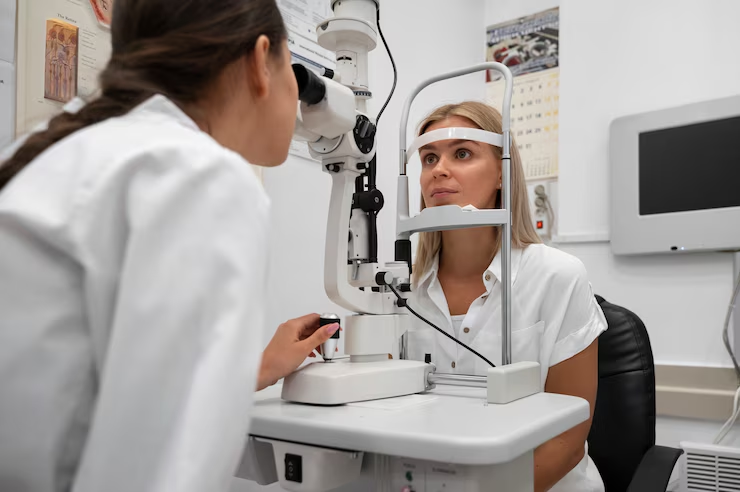
Children: First exam at 6 months, again at 3 years, and before first grade.
Adults (18–60 years): Every 2 years.
Seniors (61+ years): Annually.
People with Risk Factors (diabetes, family history): Annually or as recommended.
Regular exams can catch issues early and help prevent long-term damage.
Follow the 20-20-20 Rule for Digital Eye Strain
With digital screens now part of our daily routine, many people experience digital eye strain, also known as computer vision syndrome. This condition has become more common due to long hours spent on phones, tablets, and computers.
Symptoms of digital eye strain include dry eyes, frequent headaches, blurred vision, and even neck or shoulder pain. These signs often appear after continuous screen use and can affect focus, comfort, and productivity.
To prevent discomfort, practicing good eye care is important. Simple habits like taking regular screen breaks, adjusting lighting, and blinking often can reduce eye strain. Including routine eye care in your lifestyle helps protect your eyes from long-term stress and supports better vision health in the digital age.
To combat this:
Every 20 minutes, look away from your screen.
Focus on something 20 feet away.
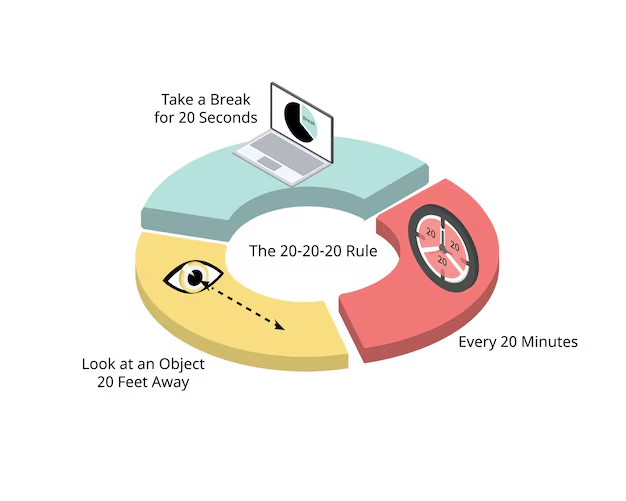
Do this for 20 seconds.
Also, consider blinking more often, using anti-glare screens, and adjusting screen brightness and font size to reduce strain.
Eat a Vision-Boosting Diet
The eyes need proper nutrients to work well and stay healthy. Just like the rest of the body, your eyes depend on what you eat to function at their best each day.
A balanced diet that includes antioxidants, vitamins, and minerals can support strong vision. Nutrients found in leafy greens, colorful fruits, nuts, and fish help protect the eyes from damage and reduce the risk of common conditions like cataracts and age-related vision loss.
Good eye care starts with healthy eating habits. Making smart food choices can be a simple and effective way to care for your eyes. Along with regular eye checkups, a nutrient-rich diet is an important step toward lasting eye health and clear vision.
Best Nutrients for Eye Health:
Vitamin A: Essential for night vision and preventing dryness. Found in carrots, sweet potatoes, and leafy greens.
Vitamin C & E: Protect against oxidative stress. Found in oranges, strawberries, almonds, and sunflower seeds.
Lutein & Zeaxanthin: Reduce risk of chronic eye diseases. Found in spinach, kale, and corn.
Omega-3 Fatty Acids: Support retinal function and prevent dry eye. Found in salmon, flaxseeds, and walnuts.
Zinc: Helps with night vision. Found in meat, legumes, and pumpkin seeds.
Adopting a diet rich in these nutrients is one of the most powerful ways to support your eye health naturally.
Protect Your Eyes from UV Rays
Just like your skin, your eyes can be harmed by too much exposure to ultraviolet (UV) light. Many people don’t realize that sunlight can have long-term effects on their vision and eye health.
Prolonged exposure to UV rays increases the risk of serious conditions such as cataracts, macular degeneration, and even eye cancer. These problems often develop slowly and may not show symptoms until they become advanced.
Protecting your eyes from UV damage is an important part of eye care. Wearing sunglasses with UV protection, wide-brimmed hats, and avoiding direct sunlight during peak hours can help. Taking these simple steps daily helps keep your eyes healthy and safe from harmful rays over time.

Protective Measures:
Wear sunglasses that block 99–100% of UVA and UVB rays.
Choose wraparound frames to protect the sides of your eyes.
Wear a wide-brimmed hat during sunny days for extra protection.
Never look directly at the sun—even during an eclipse.
Don’t make the mistake of choosing sunglasses based on style alone—check the UV protection label before you buy.
Stay Hydrated and Prevent Dry Eyes
Dry eyes happen when your eyes don’t produce enough tears or when the tears evaporate too quickly. This leads to a lack of proper moisture and can cause discomfort or irritation.
Common causes of dry eyes include extended screen time, aging, exposure to wind or dry air, certain medications, and not drinking enough water. These factors can reduce tear production or affect tear quality, leading to a gritty or burning feeling in the eyes.
Practicing regular eye care can help manage and prevent dry eyes. Taking screen breaks, using a humidifier, staying hydrated, and wearing protective eyewear outdoors can all support better tear health. If symptoms persist, an eye exam can help find the best solution.
Tips to Prevent Dry Eyes:
Drink plenty of water (8–10 glasses per day).
Use a humidifier in dry indoor environments.
Blink more often, especially when using screens.
Use lubricating eye drops if necessary (consult a doctor first).
Avoid direct air from fans or air conditioners.
Hydration isn’t just good for your body; it’s vital for your vision too.
Quit Smoking (or Never Start)
Smoking has a serious impact on your overall eye health. It damages important parts of the eye and increases the risk of several vision problems that can become permanent over time.
People who smoke are more likely to develop cataracts, optic nerve damage, and age-related macular degeneration. These conditions can slowly reduce vision and may even lead to complete blindness if not managed properly.
Quitting smoking is a powerful step toward better eye care. Along with regular eye exams and a healthy lifestyle, avoiding tobacco helps protect your vision for the long term. Eye care isn’t just about checkups—it’s also about making choices that support strong, healthy eyes every day.
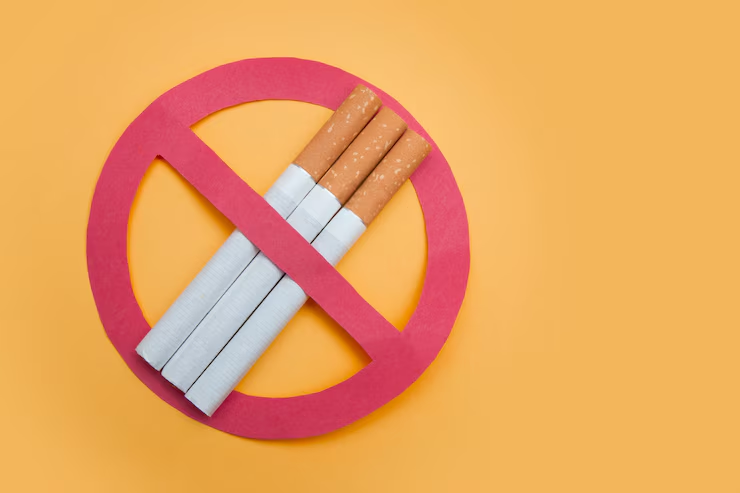
How Smoking Affects the Eyes:
Reduces blood flow to the eyes.
Increases buildup of harmful substances in the lens and retina.
Damages the optic nerve.
Quitting smoking can significantly reduce these risks and improve your overall health. If you’re struggling to quit, seek medical support or join a smoking cessation program.
Practice Safe Contact Lens Use
Wearing contact lenses the wrong way can lead to serious eye problems. Poor hygiene or extended wear beyond the recommended time increases the risk of infections and long-term damage to the eyes.
Issues like redness, pain, blurred vision, or sensitivity to light may signal an infection caused by bacteria or fungi. In severe cases, improper contact lens use can lead to corneal ulcers or even vision loss if not treated quickly.
Practicing safe habits is a key part of proper eye care. Always wash your hands before touching lenses, follow cleaning instructions, and never sleep in contacts unless approved. Good lens care helps protect your eyes and ensures clear, comfortable vision every day.
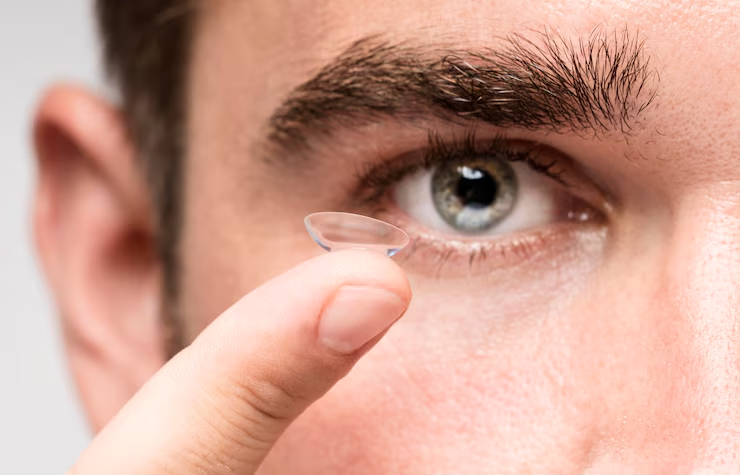
Best Practices:
Wash hands thoroughly before handling lenses.
Never sleep with contact lenses unless prescribed.
Avoid using tap water to clean lenses.
Replace lenses and cases as recommended.
Follow your optometrist’s cleaning and wearing guidelines.
Also, give your eyes a break from contacts by wearing glasses occasionally to reduce irritation and infection risk.
Ensure Proper Lighting and Ergonomics
Poor lighting and bad posture can lead to eye strain, especially during long hours of work or study. When the lighting is too dim or too bright, your eyes work harder to focus, which can cause discomfort.
Improper posture can also contribute to eye fatigue. Sitting too close to the screen or at the wrong angle affects how your eyes focus and may lead to headaches, blurred vision, or dry eyes over time.
To support good eye care, create a comfortable workspace. Use proper lighting, maintain a straight sitting posture, and keep screens at eye level. These simple changes can help reduce strain and protect your vision throughout the day.
Tips for Better Visual Ergonomics:
Use ambient lighting to reduce screen glare.
Position your computer screen 25 inches away from your eyes.
Keep the center of the screen 4–5 inches below eye level.
Use an anti-glare screen filter.
Adjust brightness and contrast settings to comfortable levels.
These small adjustments can significantly enhance comfort and preserve vision in the long term.
Eye Care for Different Age Groups
| Age Group | Eye Care Tips |
|---|---|
| Children | – Limit screen time. – Ensure proper lighting for reading/homework. – Schedule eye exams before school starts. |
| Adults | – Monitor for early signs of vision change. – Wear protective eyewear for work or sports. – Maintain a healthy diet and lifestyle. |
| Seniors | – Be vigilant about symptoms of cataracts, AMD, and glaucoma. – Get annual eye exams. – Use brighter lights and magnifiers if needed for reading. |
Conclusion
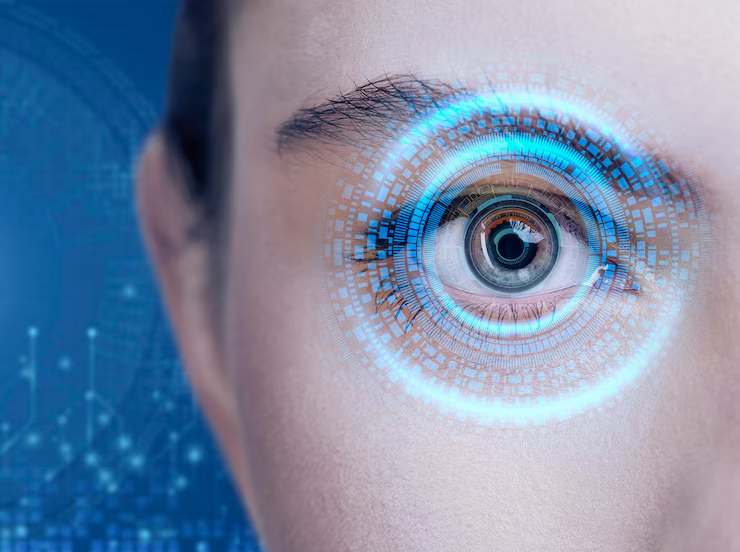
Eye care is essential at every stage of life. From childhood to old age, our eyes require attention, protection, and regular checkups to stay healthy. With the rise in screen time, poor lifestyle habits, and environmental factors, vision problems are becoming more common. However, many of these issues can be prevented or managed with simple daily habits and awareness.
Proper lighting, good posture, and protective eyewear can reduce eye strain and prevent injuries. A healthy diet, rich in essential nutrients, supports strong vision and lowers the risk of age-related conditions. Regular eye exams play a vital role in detecting problems early, often before symptoms appear.
By making eye care a priority, we can preserve our vision and overall quality of life. Whether you’re a child, adult, or senior, it’s never too early or too late to take care of your eyes and protect your sight for the future.
FAQs
How often should I get my eyes checked ?
Adults should have an eye exam every 1–2 years, while children and seniors may need more frequent checkups based on their age and health.
Can screen time really harm my eyes ?
Yes, long hours of screen use can lead to digital eye strain, causing dryness, blurred vision, and headaches. Taking regular breaks helps reduce strain.
What are early signs of eye problems ?
Common signs include blurry vision, frequent headaches, eye pain, double vision, or difficulty seeing at night. See an eye doctor if you notice any of these.
How can I protect my eyes from UV rays ?
Wear sunglasses that block 100% of UVA and UVB rays whenever you’re outdoors, even on cloudy days.
Is diet important for eye care ?
Yes, foods rich in vitamins A, C, E, and omega-3 fatty acids support eye health and can help prevent age-related vision issues.
